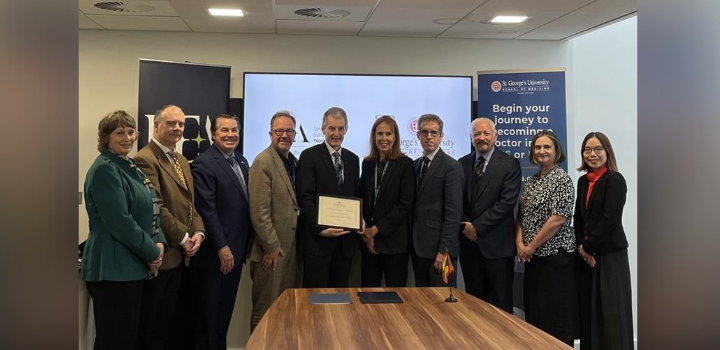Patients with a chronic lung disease who live further from hospital or in the most deprived areas have a poorer survival rate
By: Owain Delf

Patients with pulmonary fibrosis from the poorest areas had more severe symptoms by the time they saw a hospital doctor and had a poorer survival than those living in wealthier areas, according to the new research.
The study, led by the University of East Anglia, also found people living furthest from a hospital pulmonary fibrosis centre also had shorter life expectancy than those living closer.
It is estimated that 32,500 people in the UK are living with idiopathic pulmonary fibrosis (IPF), a chronic progressive scarring lung disease which makes it difficult to breathe.
Lead author Professor Andrew Wilson, of UEA’s Norwich Medical School, said: “This is the first time that social deprivation and travelling distance to hospital has been linked to survival for people with pulmonary fibrosis living in the UK.
“People planning hospital services for people for pulmonary fibrosis should consider those living far from hospitals and those from poorer backgrounds to make sure these people get the care they need.”
The researchers used data collected from the British Thoracic Society Interstitial Lung Diseases Registry between 2013 and 2021.
For the 2,359 patients included in the study, they calculated a deprivation score1, time from initial symptoms to hospital attendance and the linear distance between hospital and home postcodes.
It found the most deprived patients had a 36pc increase in the risk of death compared to the least deprived and when other factors like smoking, gender, age, distance to hospital and time to referral were considered there was still a 39pc increase in the risk of death.
However, the study found that the effect of social deprivation was mainly confined to the most deprived.
Patients living furthest from a respiratory clinic also had worse survival rates compared to those living closest. An unadjusted analysis found there was a 34pc increased risk of death for those living furthest away, compared to those living closest, and when allowing for other factors there was still a 29pc increase in the risk of death.
Bradley Price, director of policy and public affairs for the charity Action For Pulmonary Fibrosis, said: “This research highlights an alarming disparity in healthcare quality and access that demands urgent attention.
“Where you live or your socioeconomic status should not determine how long you live.
“This is unacceptable. Change is needed to ensure that everyone has timely access to diagnosis, treatment and care.
“A regional integrated approach with more specialist centres, as outlined in OneVoiceILD's2 integrated care pathway, would go some way in reducing some of the factors outlined in this publication.”
The results suggest that future screening programmes and policies could be put into place to mitigate the differences in socioeconomic levels, however more research is needed into this and to see if the ability to access care closer to home improves survival.
The study found that 40pc of patients had symptoms for more than two years prior to being seen in specialist clinics.
Other patients reported high rates of respiratory symptoms prior to diagnosis, with nearly 80pc of patients seeing a GP or being seen in a primary care setting in the year prior to referral.
The researchers say this suggests there is a need to advocate for greater awareness of IPF in primary care and care closer to home may result in greater survival.
The study was conducted in partnership with Ulster University, the Department of Respiratory Medicine at the Norfolk and Norwich University Hospital NHS Foundation Trust, and the Interstitial Lung Disease Services for Bristol and Liverpool at Southmead General Hospital in Bristol and Liverpool University Hospitals NHS Foundation Trust.
‘Assessment of the impact of social deprivation, distance to hospital and time to diagnosis on survival in Idiopathic Pulmonary Fibrosis’ is published in Respiratory Medicine.
Action for Pulmonary Fibrosis is committed to reaching more people with the right information at the right time in their diagnosis and supporting the healthcare professionals who care for them.
Its telephone support service provides information and support and is for people living with pulmonary fibrosis, carers, family members and health and social care professionals and is available on 01223 785 725, Monday to Friday, between 9am and 5pm.
Alternatively, the charity can be emailed at supportline@actionpf.org.
Related Articles

UEA to launch new Clinical Sciences degree in partnership with St George’s University, Grenada
The University of East Anglia (UEA) is launching a new BSc Clinical Sciences degree for overseas fee-paying students seeking a clear, high-quality route into medical training.
Read more
Fewer nurse hours available to patients linked to higher hospital death rates
Hospitals with fewer registered nurses at the bedside are seeing higher-than-expected death rates, according to a new study involving UEA researchers.
Read more
A feast without flavour: The hidden impact of smell and taste loss at Christmas
Imagine sitting down to a festive feast and tasting… nothing. For thousands of people in the UK, smell and taste disorders turn Christmas into a season without flavour or aroma impacting joy, nutrition, and even mental health.
Read more